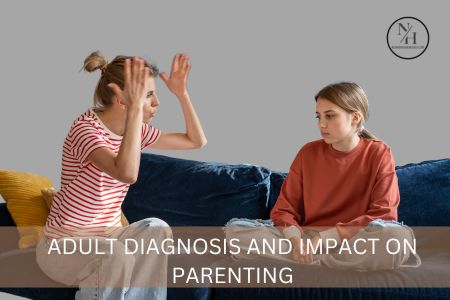Many parents receive an adult diagnosis after having their son or daughter diagnosed. Some studies show a possible genetic link in most neurodivergent conditions. While the accuracy of these studies is not the scope of this post, we want to look at how getting a diagnosis for the parent can also impact the parent-child relationship.
And we admit, it’s not easy to juggle the responsibilities of parenting a neurodivergent child with finding out we are neurodivergent. After all, it can well be something that seems to redefine our whole identity. It also comes with its own sets of challenges, like navigating the stigma of having a “disability.” It might take a while for us to come to grips with this reality.
In this post, we want to look at some of the possible impacts that an adult diagnosis of neurodivergence can have on parenting.
5 Effects of an Adult Diagnosis on Parenting
We want to be honest. Just because some things finally “click” when we get our neurotype diagnosis in adulthood, it doesn’t magically make issues disappear. But here are what we believe to be some of the effects that an adult diagnosis can have on our parenting:
1. It can cause a roller-coaster of emotions.
While this list is in no way chronological, it’s very common for adults who get a diagnosis to experience a roller-coaster ride of emotions. This is inevitable and understandable. We have to wade through all our own beliefs about neurodivergence, labels, disabilities, and all that stuff.
Our recommendation is, take all the time you need to process this. If your season in parenting means that you can’t really take time “off,” perhaps an hour or two each week where you can decompress and journal some of your thoughts can already be beneficial.
2. It can help remove some of the guilt of our “failures.”
Sometimes, the realization can also come that not every “failure” we had in parenting is our own fault.
First off, a disclaimer is in place: knowing we have Sensory Processing Disorder (SPD), Attention-Deficit Hyperactivity Disorder (ADHD), or autism is in no way an excuse for our behavior. (If some of your behavior has become or bordered on being abusive, we highly encourage you to seek the professional help of a counselor or therapist.)
But what if a lot of our triggers to anger or outbursts are actually related to sensory reasons, and not character flaws? A lot of the struggle with parenting, especially when parenting neurodivergent kids, is when we lose our tempers or lose our own self-control. We berate ourselves that we should know better and treat our kids more lovingly.
But if it turns out that we ourselves have a neurodivergent condition—for example, Sensory Processing Disorder, where we are constantly grated by incessant sounds and other sensory input, that can explain a lot of our anger issues. It may not explain everything, but at least a part of it. So in a way, it can help remove some of the guilt we have at our “failures” in parenting.
3. It helps us be more intentional at preventing our own meltdowns.
Meltdowns are caused by triggers—and usually, a series of them. Before we learned about our neurotype, we may not have been conscious of these triggers. But after we get an adult diagnosis, most likely, our therapist would have helped us identify some of these things that set us off.
In my experience of learning I had sensory processing sensitivities, my family and I started to understand that the triggers are sensory. Then we were able to make appropriate action plans to make things easier to handle in the future. For example, wearing noise-cancelling headphones or earplugs helps reduce the stress that comes from unwanted sounds. When the overall stress level is reduced, it’s much more possible to prevent meltdowns.
4. It makes us more self aware.
One of the biggest benefits of getting an adult diagnosis is that we can be more aware of ourselves. This means that we learn more about what refreshes us, what irritates us, and a plethora of other things that affect our mental wellbeing, especially in the context of parenting.
For example, some of your parenting and household habits might make sense in light of your neurotype, and you don’t need to try to be like other parents you see on social media. Instead, you can learn to find ways around your own strengths and limitations.
5. We can be more intentional with our self-care.
Some neurotypes, such as those on the autism spectrum, may have much lower social batteries than neurotypicals. This means that we might need to be more intentional with carving out time to take care of ourselves. Knowing this gives us permission to do so.
Then, when we are intentional about our self-care, it can also result in a greater quality of life and an improved way of relating to other people, including the way we parent our children.
Adult Diagnosis Affects Parenting
Like it or not, getting a neurodivergence diagnosis in adulthood will affect every area of our lives, including our parenting, if we are parents.
Again, getting an official diagnosis is still a decision that each individual needs to make, and we are in no way promoting one or the other. This post is meant only to share some of the possible effects that an adult diagnosis can have on parenting, and is in no way a guarantee that problems will magically disappear.
If you are considering getting a diagnosis, we recommend you to speak with qualified professionals about your concerns, and we hope you can find some answers that can help enhance your quality of life and the relationships around you.

